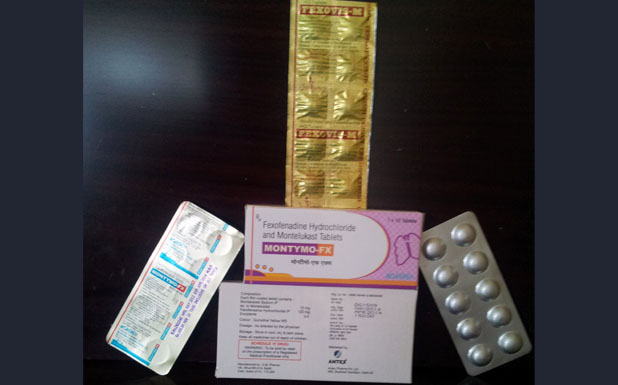Fexofenadine Hydrochloride is a second - generation antihistamine pharmaceutical drug (is prevents the release of other allergy chemicals and increased blood supply to the area, and provides relief from the typical symptoms of hay fever).
Indications and Usage:
Asthma, Chronic Allergic, Seasonal Allergies, Used For Hay Fever or Allergies.
Rationale of Combination:
This drug continues to work for 12 hr - 24 hr. A large study found that Cetirizine was associated with an increased risk of heat arrhythmias comparison to Fexofenadine.
It has been demonstrated by recent studies that the treatment of allergic rhinitis with concomitant administration of an antileukotrien (montelukast) and an antihistamine (Fexofenadine), shows significantly better symptoms relief compared with the modest improvement of rhinitis symptomatology with each of the treatments alone.
| (FEXOFENADINE HCL) | (MONTELUKAST) | |
| HAY FEVER OR ALLERGIES | ASTHMA | |
| What is it? | A bodily reaction to usually harm - less substances in the environment - most often pollen, mold, and animal dander. |
A condition in which the tubes in the lungs become swollen and narrow, making it difficult to breathe and get enough oxygen in and out of your lungs. Can be triggered by pollen, mold, dander, smoke and air pollution, exercise, other illness, stress, and some drugs. |
| Why do some people get it? | Generic predisposition | Generic predisposition |
| Can strike people of all ages, but often shows up in childhood and teen years. | Infection can trigger asthma | |
| Usually shows up in childhood; less commonly strikes over age 25. | ||
| Main Symptoms | Sneezing | Mild attacks: |
| Teary eyes | Feeling out of breath | Itchy nose and throat | Tightness in chest | Congestion, runny nose | Wheezing |
| Clear nasal discharge | Coughing | |
| Cough (Sometimes) | ||
| Severe attacks: | ||
| Difficulty breathing (sometimes) | Very difficult to breath | |
| Headache (sometimes) | Difficulty talking | |
|
Skin feels if it's pulled tightly around ribs and neck | ||
| Itchy red patches on skin (hives) | Rapid heartbeat | |
| Main Treatment Options | Nasal Sprays |
Inhalers and nebulizers containing short acting bronchodilators. |
| Antihistamine | Inhalers containing steroids | |
| Decongestants | Leukotriene - block pills | |
| Allergy shots | Steroid pills or shots | |
| Immune - system modifiers |
Drug Interaction:
BEFORE TAKING THIS MEDICINE TELL THE DOCTOR ABOUT ANY MEDICAL PROBLEMS AN ALLERGIES RELATED ASTHMA.
Some medicines may affect how patient's works, or other medicine work. If anyone is taking or has recently taken other medicines, including those obtained without a prescription.
Theophylline, predisolone, oral contraceptives, terfenadine, digoxin, warafin, thyroid hormones & sedative hypnotics, Antifungal medicine (ketokonazole), aspirin, fruit juice.theophylline, erythromycin, antacids, cimetidine
Indication:
●Montelukast causes inhibition of airway cysteinyl leukotriene receptors as demonstrated by the ability to inhibit bronchoconstriction due to inhaled LTD 4 in asthmatics.
●For Chronic Allergic conditions like seasonal allergic rhinitis, perennial allergic rhinitis, Rhinitis associated with Ashtma.
●Monteluakst may offer an alternative to Theophylline as add - on therapy is asthma poorly controlled by short acting beta - agonist and inhaled corticosteroids.
●Montelukast causes inhibition of airway cysteinyl leukotriene receptors as demonstrated by the ability to inhibit bronchoconstriction due to inhaled LTD 4 in asthmatics.
●For Chronic Allergic conditions like seasonal allergic rhinitis, perennial allergic rhinitis, Rhinitis associated with Ashtma.
Monteluakst may offer an alternative to Theophylline as add - on therapy is asthma poorly controlled by short acting beta - agonist and inhaled corticosteroids.
Fexofenadine is antihistamine that reduces the effects of natural chemical histamine in the body. Histamine can produce symptoms sneezing, itching, watery eyes, and runny nose.
It is used to treat the symptoms a seasonal allergies (hay fever) in adults and children also used in skin itching and hives caused by a conditions called chronic idiopathic urticaria in adults and children.
Adverse Effects:
●Nausea, diarrhea, upset stomach
●Menstrual cramps
●Drowsiness, Tired feeling.
●The most commonly reported adverse reactions were headache, asthma and upper respiratory tract infections; however none were significantly different in frequency between the groups.
Contraindications:
Hypersensitivity, pregnant patients, patients with blood and lymphatic system disorder and psychiatric disorder.
Conclusion:
This is a new combination for severe allergy which could be a sign of asthma; most people who have asthma also have underlying allergies can take this medicine. In people who have allergies and allergy - induced asthma the body's immune system overreacts when exposed to otherwise harmless substances, such as pollen, dust mites, mold spores, and animal dander.
In people with allergies are at much higher risk of developing asthma and sinus infections (sinusitis) and the inflammation that a compares the allergic response can damage the respiratory system and make more susceptible to lung infection like pneumonia.
Asthma often co-exists in patients with persistent allergic rhinitis. The combination of Fexofenadine + Montelukast equally reduces the serum SICAM - 1 concentration and gives the same clinical effect in pateings The study shows to investigate the effects of treatment with a combination of antihistamine (Fexofenadine) and an antileukortiene (Montelukast) in patients with persistent allergic rhinitis and newly diagnosed asthma.
The use of Moneluakst in the treatment of seasonal allertic rhinitis is more effective than placebo, an effective as Loratidine and in combination with antihistamine is perhaps more effective for allevialing congestion symptoms than antihistamine alone.
From the above discussion, it can be concluded that this medicine could improve the quality of life of patients with allergic rhinitis as well as asthma in addition to being efficacious as immunotherapy in seasonal allergic rhinitis. Moreover it has a considerable safety profile, with persistent results. This combination offers as effective, well tolerated and convent treatment option for children with asthma and allergies.
